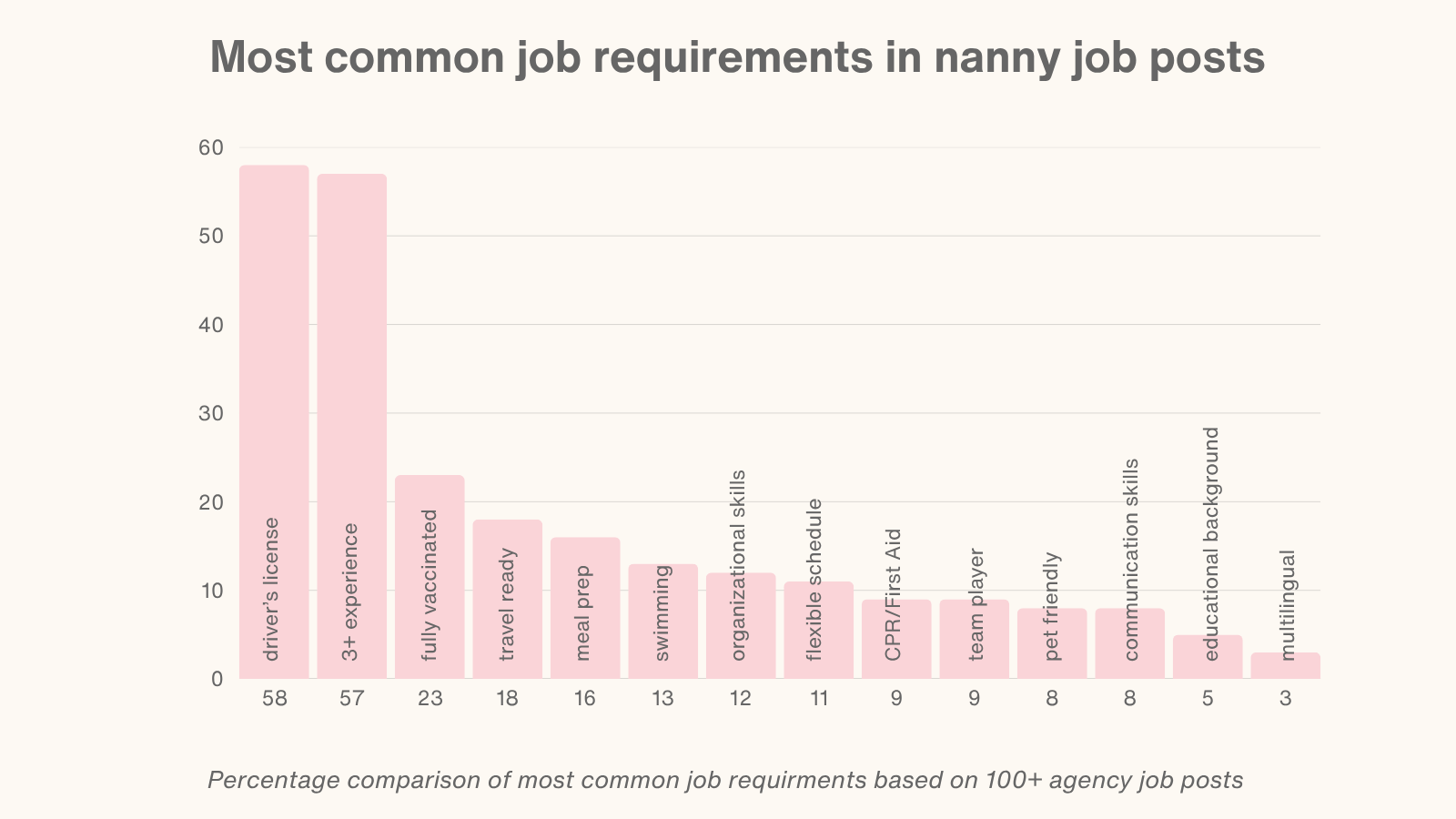
Supernanny or Superhuman?
Listen to This Post
They don’t wear name tags. Their titles shift from one household to the next. But behind the job posts, filled with phrases like “proactive,” “flexible,” and “team player”; is a role that’s both deeply personal and professionally demanding. These are the people parents trust with their homes, their children, and their daily rhythms. But what, exactly, do families ask for when they go looking for help?
To find out, I analyzed over 100 job listings across:
- one national app platform
- a range of agency roles
- a set of specialized travel nanny positions
What the data taught me?
Expectations varied depending on where a job was posted, the kind of family hiring, and the level of professionalism required. But across the board, the nanny role was broadening; quietly and consistently; into something much more layered.
Some listings focused on essentials: warmth, safety, dependability. Others described a hybrid of caregiver, educator, logistics manager, and domestic support. The more exclusive the placement, the more the job resembled a multi-disciplinary role; with travel, scheduling, and discretion built into the contract.

This isn’t necessarily a bad thing. Many experienced nannies thrive in environments where they’re trusted to do more, especially when expectations are clear, and the pay is right. But it does raise a thoughtful question:
What, exactly, are we hiring for when we say “nanny”?
On paper, most positions start with a simple title: nanny. But the actual requirements reveal something broader. Depending on the family and setting, a nanny might also be expected to:
- Transport children in their own car or one provided by the family; which, of course, must be clean, safe, and properly insured; all while maintaining a spotless driving record
- Prepare healthy, well-balanced meals, not just for the children, but sometimes for the entire family
- Keep the house tidy and organized, assist with laundry, or coordinate with housekeepers
- Create enriching educational routines or manage after-school schedules
- Understand child development milestones and preferably speak a second language

In agency listings, additional expectations surface, often shaped by the values of the household:
- Hold a college degree, often in education or a related field
- Be available to travel internationally or domestically, sometimes on a moment’s notice
- Demonstrate a polished appearance, healthy lifestyle habits, and show flexibility with scheduling
- Present skills such as swimming, skiing, or tennis
- Show strong communication skills and the ability to collaborate within a fully staffed home
This layering of roles isn’t always stated outright, but it is present in the language:“Must be proactive.” “No task too big or too small.” “Team player in a dynamic household.”
Behind these phrases lies an implicit understanding; this job will require everything: flexibility, poise, and professional judgment.
A good nanny knows how to support without overstepping, how to soothe without replacing, and how to balance emotional presence with professional boundaries.
It’s not something you can easily put on a resume, but it’s one of the most demanding parts of the job.
The Gap Between Perception and Reality

Despite this complexity, the public perception of nannying often remains outdated. To many, the word still conjures images of a teenage babysitter or a casual helper. Some assume it’s a temporary job. Others consider it “unskilled” labor.
In consequence, despite this scope, many nannies find it difficult to shift into other industries later. The role is often misunderstood, its responsibilities minimized, its depth overlooked.
Do you see nannying as a long-term career?
Current Results:
We often recognize nurses as essential professionals, trusted with health and safety. Yet nannies, who are also responsible for children’s well-being and development, rarely receive the same public respect. This gap isn’t just theoretical; it shows up in real conversations. Online communities, especially among nannies, are full of firsthand accounts that reveal how often the gravity of the job is dismissed, downplayed, or misunderstood.
In forums like Reddit, caregivers share the small jabs and sweeping assumptions they encounter from strangers, extended family, or even close friends. The message? That what they do isn’t quite enough. One comment captures the frustration many feel:
"What is with nannying not being viewed as a “real job”? Where does this mindset come from? I have heard multiple comments from a variety of family members like “all you do is play with a kid all day."
— Reddit user, r/Nanny, March 26, 2024
Final Thought: Not Superhuman - Just Super Capable

Modern nannying isn’t about doing everything. It’s about doing the right things; for the right families; with clarity, respect, and purpose.
Some nannies manage two nap schedules, meal prep, and developmental milestones before noon. Others juggle homework help, pet care, and piano recitals while coordinating bedtime. Some hop time zones. Some hold space for anger and anxiety. Some teach children to tie their shoes, speak two languages, or find their voice, even when it shakes. Again and again, form one job to another. They aren’t superheroes. They’re professionals. They’ve trained for this. Chosen this. And, in many cases, built entire lives around showing up fully for someone else’s family. So no, they don’t need capes. Just a little more credit.
More Job Market

Job Market
Why Some Nannies Work Off the Books (And Why Some Don’t)
On the books or off the books? You won’t see it on job boards or agency websites, but on Facebook, in local groups and comment threads, this is one of the most common dilemmas.

Job Market
What Benefits Can a Nanny Ask For?
From stipends to paid holidays, here’s what nannies are negotiating today, a closer look at the benefits conversation no one finds easy to start.

Job Market
Agencies, Apps, and Au Pairs: One Job Title, Many Realities
I expected job listings, what I found was a glimpse into the wildly different ways nannies work and get paid.
Curious what’s typically expected, and what you’re truly comfortable with? Check out the free Nanny Job Scope checklist to clarify your boundaries, understand job expectations, and identify the type of nanny you are.

Written by Sylwia Glinska
Founder of Bottles & Bytes • Nanny, Newborn Care Specialist & Childcare Consultant
Get To Know Me